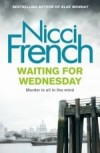Certain books should carry the equivalent of a health warning. ‘Do not read this book unless you have read all the books in the series in sequence.’ Having said that, I don’t think it should be necessary. A book should either stand-alone or, if it  references earlier works, the references need to be woven unobtrusively into the plot. It’s not what happens here. Great chunks of backstory are shoehorned in, getting in the way and adding to the confusion (of which there is a lot.) There seem to be several different plots, going off at tangents. And running through it a sort of ‘comic caper’ involving a Polish plumber and a bath.
references earlier works, the references need to be woven unobtrusively into the plot. It’s not what happens here. Great chunks of backstory are shoehorned in, getting in the way and adding to the confusion (of which there is a lot.) There seem to be several different plots, going off at tangents. And running through it a sort of ‘comic caper’ involving a Polish plumber and a bath.
I was looking forward to reading Waiting for Wednesday. I was thrilled to discover that there were at least three Nicci French books that I hadn’t read. I’d loved all her other books – The Memory Game, Until it’s Over, What to Do When Someone Dies to name just a few. I’d actually enjoyed the first Frieda Klein story Blue Monday. Maybe I wasn’t reading it critically or perhaps because it was the first in the series it didn’t suffer from the problems I encountered here.
Detail follows detail, adding to our knowledge of the family who live here, while we hold our breath, waiting for the inevitable
Before I talk about these, I want to highlight some of the great things in this book. The opening for a start. It’s brilliant. The first paragraphs describe an ‘ordinary terraced house’, offering numerous small details that subtly build a picture of the type of people who live there. Thus ‘the paved and gravelled garden’, a ‘single trainer with its laces still done up under the window’, ‘a bird table with a few seeds scattered on its flat surface’. This is more than an excellent description. This is crime fiction from a highly skilled and creative writer. So we know we are being set up.
We are. Next we meet the cat. We follow it through the cat flap and around the house. It takes its time (it’s a cat). The tension racks up (this is first class writing). Detail follows detail, adding to our knowledge of the family who live here, while we hold our breath, waiting for the inevitable. We’re not disappointed. I won’t go into any more detail, except to say that this book is actually worth reading for this first chapter alone. There’s more to be enjoyed too. Her portrayal of the teenagers is spot on. There are small, realistic and insightful touches such as Fearby, the old journalist who visits a bird sanctuary for comfort after having left the oppressive prison. His character is well drawn and believable, as is the victim’s sister, the rather obnoxious Louise.
In contrast the main player, Frieda, is not plausible. Maybe for a fairly stereotyped portrayal of a psychotherapist but not for someone who would be let within a mile of a police investigation. Not in a million years. She’s irrational. Dysfunctional. In fact altogether a bit of a mess. This would be OK if there was anything endearing about her. There isn’t. I just didn’t care. I wanted to. I began the book in that frame of mind. However I became so irritated by her that once or twice I nearly abandoned the book. And for me to abandon a Nicci French book is something I would have said was unthinkable.
The various plot seem to have nothing much to do with each other, the only common denominator being their overall implausibility and the exasperating Ms Klein.
I didn’t enjoy this book. I was too annoyed. The beautifully written passages and sparkling, lively descriptions are far outweighed by clunky sections referring to previous events. These are only partly successful as they still leave many questions unanswered. The various plots seem to have nothing much to do with each other, the only common denominator being their overall implausibility and the exasperating Ms Klein. The introduction of her lover/former lover/close friend/who knows in the form of a letter tacked on to the end of the first chapter is abrupt. The builders Josef and Stefan are comedy stereotypes, along with Reuben whom I initially thought was a builder too. He turned out to be a psychotherapist. The whole tangled skein of her hinted-at involvement with the detective Karlsson, the appearance of her stalker and her antagonistic relationship with Bradshaw, yet another psychotherapist, makes little sense without having read Tuesday’s Gone.
Altogether, a huge disappointment. I hate it when this happens. I don’t like giving writers less than glowing reviews. Especially a favourite crime novelist who’s given me so much pleasure in the past. This won’t stop me reading more Nicci French books but I think I’ll steer clear of Ms Klein and stick to the stand-alones in future.
